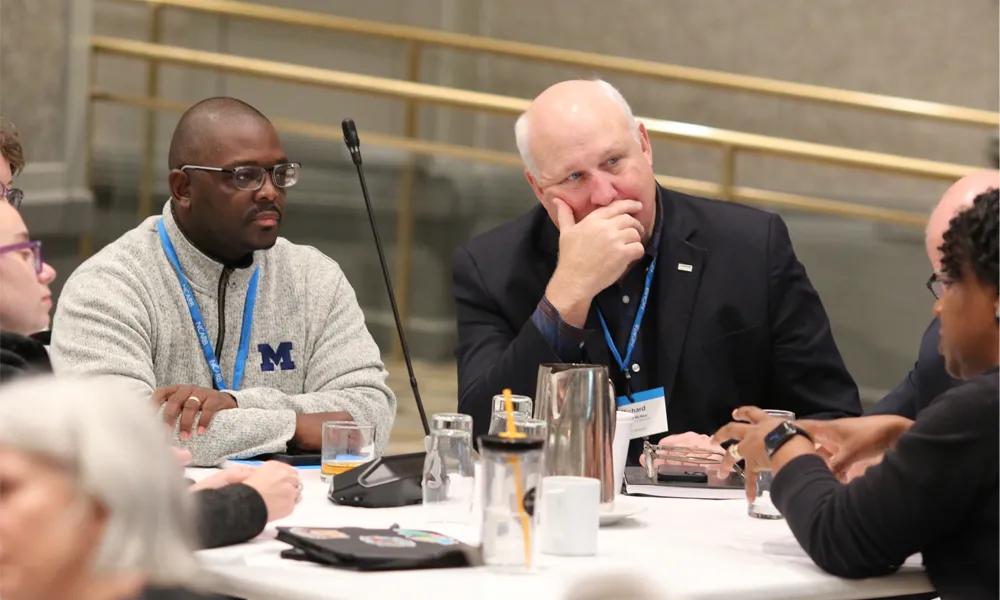The FY23 Annual Report provides a comprehensive overview of NCARB’s efforts in the past year as we work alongside the 55 U.S. licensing boards to facilitate architectural licensure. Read the full report or explore highlights from FY23 below.

Program Service & Excellence
In FY23, NCARB retired the Architect Registration Examination® (ARE®) rolling clock policy and implemented a new score validity policy to ensure candidate competency while removing unnecessary barriers effectively.
12% increase in pass rates for practice exam users, with even greater increases seen for certain minority groups
NCARB also launched free practice exams for all six divisions of the ARE. Data collected since the launch showed an average 12% increase in pass rates for exam users, with even greater increases seen for certain minority groups.
NCARB and its counterpart in the United Kingdom, the Architects Registration Board (ARB), signed a mutual recognition agreement (MRA) that enables eligible architects in the U.S. and U.K. to benefit from a more straightforward licensure process.
Data Analysis & Thought Leadership
NCARB released its 12th edition of NCARB by the Numbers with an expanded examination section that allows readers to explore the impact of our recently launched practice exams on pass rates for various demographic groups.
NCARB and NOMA released the fourth full report on the organizations’ joint study on diversity and attrition along the path to licensure: Baseline on Belonging: Firm Culture and Early Career Development.
An in-depth look at the experiences of minority groups working within firms
After receiving 14,000 responses to the Analysis of Practice survey in FY22, NCARB spent the following fiscal year reviewing findings with consultants at Alpine Testing Solutions. Results from the study may lead to future changes to national licensing programs and standards.
Increasing Access & Inclusivity
At the FY22 Annual Business Meeting, NCARB’s membership voted to create a permanent Diversity, Equity, and Inclusion (DEI) Committee. The committee is collaborating with the Board to create a proposed roadmap of DEI goals for the organization to meet by 2030 and develop methods to draw new volunteers and members into the leadership pipeline.

Want More Insights?
Read through the FY23 Annual Report Highlights for an overview of our work on the objectives above.
In FY23, President Bayliss Ward created two new task forces exploring what skills should be required for licensure and what the process for developing those skills should look like.
The Competency Task Force began researching and identifying what knowledge and skills should be required for entry-level competency. The Licensure Process Research & Development Task Force explored various architect licensing approaches that best address aspects of cost, efficiency, flexibility, and equity.
Advocacy Support & Coalition Building
Throughout the year, NCARB tracked hundreds of bills and regulations and engaged in legislative and political challenges nationwide that could impact the regulation of architecture or an architect licensing board’s ability to carry out its mission.
Cultivating partnerships has remained another fundamental pillar of NCARB’s advocacy success.
Our commitment to the Alliance for Responsible Professional Licensing (ARPL), AIA state chapters, and related national regulatory members of the Interorganizational Council on Regulation (ICOR) underscores our commitment to advancing shared interests through strategic cooperation.

In addition to more detailed versions of the insights above, the full FY23 Annual Report includes:
- A timeline of our key efforts from July 2022 to June 2023.
- Volunteer reports featuring highlights from our Board of Directors and committees.
- An overview of NCARB’s organizational structure, business updates, the current NCARB Bylaws, and financial statements.
On behalf of the Council, we are pleased to welcome you to the FY23 NCARB Annual Report.
